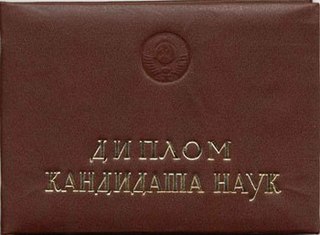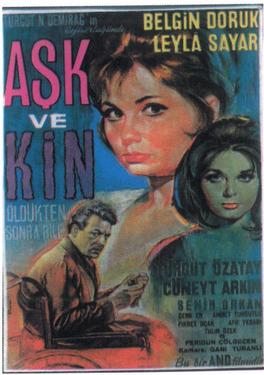
Faust is the protagonist of a classic German legend based on the historical Johann Georg Faust. The erudite Faust is highly successful yet dissatisfied with his life, which leads him to make a pact with the Devil at a crossroads, exchanging his soul for unlimited knowledge and worldly pleasures. The Faust legend has been the basis for many literary, artistic, cinematic, and musical works that have reinterpreted it through the ages. "Faust" and the adjective "Faustian" imply sacrificing spiritual values for power, knowledge, or material gain and / or making a risky bargain with seemingly good intentions that goes terribly wrong.
A Doctor of Science is a science doctorate awarded in a number of countries throughout the world.

Camp Concentration is a 1968 science fiction novel by American author Thomas M. Disch. After being serialized in New Worlds in 1967, it was published by Hart-Davis in the UK in 1968 and by Doubleday in the US in 1969. Translations have been published in Dutch, French, German, Spanish, Italian, Serbian and Polish.
Doctor Faustus or Doctor Faust may refer to:

Doctor Faustus is a German novel written by Thomas Mann, begun in 1943 and published in 1947 as Doktor Faustus: Das Leben des deutschen Tonsetzers Adrian Leverkühn, erzählt von einem Freunde.

Shiroi Kyotō is a 1965 novel by Toyoko Yamasaki. It has been adapted into a film in 1966 and then five times as a television series in 1967, 1978, 1990, 2003, and 2019. The 1966 film was entered into the 5th Moscow International Film Festival where it won a Silver Prize.

A Candidate of Sciences or Candidate of Science is the first of two doctoral level scientific degrees in Russia, some of the Commonwealth of Independent States and was the first of two doctoral level degrees in some other countries. It is formally classified as UNESCO's ISCED level 8, "doctoral or equivalent." It may be recognized as a Doctor of Philosophy, usually in natural sciences, by scientific institutions in other countries. Former Soviet countries also have a more advanced degree, Doctor of Sciences.

Sergei Appolinarievich Gerasimov was a Soviet film director and screenwriter. The oldest film school in the world, the Gerasimov Institute of Cinematography (VGIK), bears his name.

Volkmar Andreae was a Swiss conductor and composer.

Doctor Faustus is a 1967 British horror film adaptation of the 1588 Christopher Marlowe play The Tragical History of Doctor Faustus directed by Richard Burton and Nevill Coghill. The first theatrical film version of a Marlowe play, it was the only film directed by Burton or Coghill, Burton's Oxford University mentor. It starred Burton as the title character Faustus, with Elizabeth Taylor appearing in a silent role as Helen of Troy. The film is a permanent record of a stage production that Burton starred in and staged with Coghill at the Oxford University Dramatic Society in 1966. Burton would not appear on stage again until he took over the role of Martin Dysart in Equus on Broadway ten years later.
Konrad Boehmer was a German-Dutch composer, educator, and writer.
Faust has inspired artistic and cultural works for over four centuries. The following lists cover various media to include items of historic interest, enduring works of high art, and recent representations in popular culture. The entries represent works that a reader has a reasonable chance of encountering rather than a complete catalog.

Doctor of Sciences is a higher doctoral degree in the Russian Empire, Soviet Union and many post-Soviet countries, which may be earned after the Candidate of Sciences.
A Doctor of Philosophy is a terminal degree that usually denotes the highest level of academic achievement in a given discipline and is awarded following a course of graduate study and original research. The name of the degree is most often abbreviated PhD, pronounced as three separate letters.
Franz Seitz Jr. was a German film producer, screenwriter and film director. He produced more than 70 films between 1951 and 2006. He was a member of the jury at the 16th Berlin International Film Festival.

Resurrection is a 2001 Italian-French-German co-production directed by Paolo and Vittorio Taviani.
Frankfurter Kantorei is a German mixed concert choir established in 1961 by Kurt Thomas in Frankfurt. In 1969, Helmuth Rilling assumed leadership, and the choir began recording the complete Bach cantatas in 1972. From 1982 to 1997, Wolfgang Schäfer was artistic director of the Frankfurter Kantorei. Since then it has been led by Winfried Toll. The choir has performed concert tours abroad in Paris, Lyon, Venice, Turin, Vienna, Helsinki, St Petersburg, Istanbul, Los Angeles, Seattle and Toronto, among others, and first appeared in Israel in 1979. The group has made numerous CD recordings on the EMI Classics label. In 2000 they were a recipient of the Binding Kulturpreis, and in May 2000, they performed Brecht/Weill's Three Penny Opera at the Musiktriennale Köln of Cologne. The choir has a membership of about 70.

Death Is Called Engelchen is a 1963 Czechoslovak war film directed by Ján Kadár and Elmar Klos. It was entered into the 3rd Moscow International Film Festival where it won a Golden Prize.

Love and Grudge is a 1964 Turkish drama film directed by Turgut Demirağ. It was entered into the 4th Moscow International Film Festival. At the 2nd Antalya Golden Orange Film Festival it won the Golden Orange Award for Best Film.
The 13th Moscow International Film Festival was held from 7 to 21 July 1983. The Golden Prizes were awarded to the Moroccan-Guinea-Senegalese film Amok directed by Souheil Ben-Barka, the Nicaraguan-Cuban-Mexican-Costa Rican film Alsino and the Condor directed by Miguel Littín and the Soviet film Vassa directed by Gleb Panfilov.












